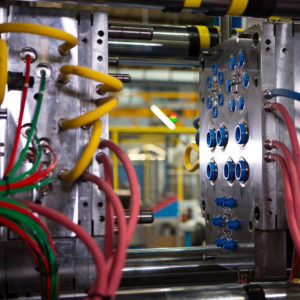Plastic injection moulding is an energy intensive process; the cost of operating an injection moulding machine over its life time often exceeds its initial purchase price. In a typical injection moulding company, over 65% of the energy purchased is consumed directly by injection moulding machines, with a further 25% consumed by supporting systems, such as cooling and compressed air generation.
 Energy is a significant and rising cost in manufacturing, which places increasing pressure on manufacturing businesses in a globally competitive market. Coupled with the environmental impact of using potentially finite and damaging resources to generate energy, BNL has reacted by establishing a Strategic Initiative project designed to improve energy utilisation and our long-term sustainability.
Energy is a significant and rising cost in manufacturing, which places increasing pressure on manufacturing businesses in a globally competitive market. Coupled with the environmental impact of using potentially finite and damaging resources to generate energy, BNL has reacted by establishing a Strategic Initiative project designed to improve energy utilisation and our long-term sustainability.
As a member of the British Plastics Federation (BPF), we have access to excellent resources that support plastics companies to develop their businesses. Recently, our Operations Manager James Severn, attended the BPF’s sustainability-focused seminar, ‘Controlling Energy Use in Plastics Processing’, led by Dr Robin Kent (Tangram Technology Ltd.), a globally recognised authority in energy management. The seminar was directly relevant to BNL’s energy utilisation initiative and provided a roadmap of workstreams to follow, enabling us to understand our energy usage with data and to tackle it objectively.
James stated, “We had developed a basic plan to reduce our energy usage earlier in the year, but Dr Kent’s seminar has enabled us to turn it in to a coherent and detailed plan that covers all aspects of energy utilisation at BNL and we have started applying these tools in the factory. That said, significant savings can come from things that are cost free and can be done immediately, so we are actively searching out and fixing air leaks on a weekly basis and auditing our equipment to ensure things not in use are turned off. We have line of sight to making meaningful improvements.”
So far BNL have invested in a new intelligent, energy-efficient compressed air dryer and have started to install barrel insulation to the injection moulding machines.
 Alongside this our plans are currently focused on:
Alongside this our plans are currently focused on:
- Communicating to our employees about this initiative via a ‘Sustainability at BNL’ board and encouraging employee involvement through suggestions and new ideas
- Reinforcing the importance of turning off equipment not in use and auditing it
- Fixing air leaks found during factory surveys
- Studying the potential benefits of installing variable speed motor controls to machines with continuously running drive
- Reviewing working practices around activities such as start-up and shutdown and tool to machine compatibility, to use the minimum energy required to run our processes
- Analysing the impact of these improvements on BNL’s energy consumption, measured as kWh/kg of processed material
BNL are keen supporters of and participants in the BPF and other trade groups, such as made in Yorkshire and the Society of Motor Manufacturers and Traders, which allow us to expand our network within the UK manufacturing industry, undertaking activities that promote sustainability and best practice in plastics and other manufacturing sectors.




 Back
Back
